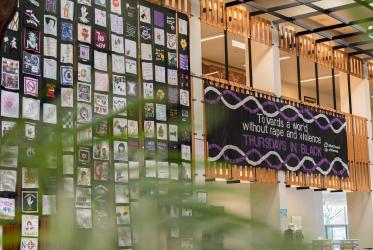Our series of interviews with Thursdays in Black ambassadors highlights those who are playing a vital role in increasing the impact of our collective call for a world without rape and violence.
Hanbeet Rhee, from the Presbyterian Church of Korea, is a member of the Ecumenical Youth Council in Korea. She is also a commissioner with the World Council of Churches (WCC) ECHOS programme, as well as a youth advisor for the WCC Central Committee.
How did you get involved with Thursdays in Black?
Rhee: I became naturally involved in this campaign. At first, I learned about the campaign by participating in the WCC Central Committee meeting. After that, I started to wear black on Thursdays, especially when I attend ecumenical meetings, including ECHOS commission meetings.
How is it taken up in your church?
Rhee: Not many South Korean churches are interested in this campaign. But there are a handful of strong people involved in the campaign, especially those opposed to gender discrimination and violence in churches.
What can young people contribute to the Thursdays in Black campaign?
Rhee: Young people can be bridges, first connecting this campaign with their lives, and connecting various generations with this movement. Many young people, especially young women, experience gender-based violence physically, mentally and structurally, and the aspects are changing from the past. So the involvement of young people in Thursdays in Black will expand the spectrum of this movement. And I think this campaign encompasses all generations, because almost every people are not free from gender-based violence, from older people to very young children. The participation of young people will make our movement more plentiful and sufficient, beyond expansion of our age group.
Why is it important for youth to be involved?
Rhee: As one of the youth, I would say: “Because Thursdays in Black is our movement.” We are also the very ones who live in this world exposed to gender-based violence. In this world, we may be victims, and we may be perpetrators of ignorance, because much of the violence hides in the structure of power, in the culture, in ideology. But through this campaign, young people can get opportunities to know what gender-based violence is and, furthermore, we can get the opportunities to participate in the solidarity for the victims, sometimes ourselves.
Have you seen any change in how people approach gender issues or violence issues?
Rhee: Personally, in wearing black, I could see more about the realities that various women and minorities are facing and could feel more the solidarity embracing wounds and holding hands together. Whenever I introduced this campaign and asked to join it, I saw people's visibility into the problems of violence and discrimination expanded, and I saw the changing of people’s thoughts as to why solidarity was needed.
What is your message about the first step people should take?
Rhee: Let's wear black. Black will lead us to justice.
To learn more about Thursdays in Black ambassadors, please contact [email protected].
Thursdays in Black Ambassadors
“Ambassadors” lead Thursdays in Black Solidarity (WCC Press release of 5 September 2019)









